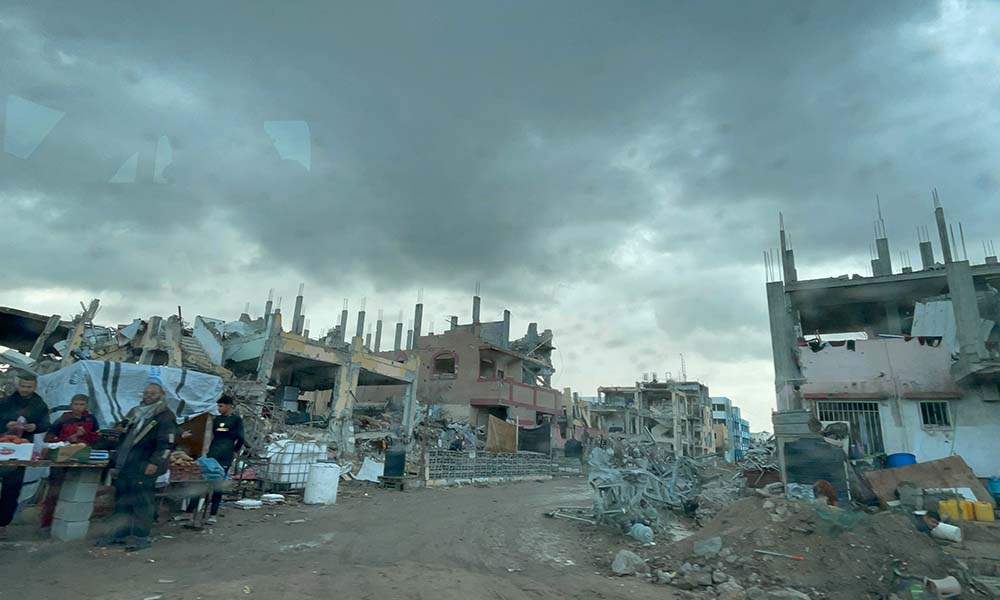Genocide Will Be Hard to Prove in Gaza. War Crimes May Be Another Story

The term “genocide” hangs like a dark cloud over Israel’s war in Gaza, amplified by images of widespread starvation in the Strip. It’s all over social media and appears increasingly in mainstream news, and global public opinion has dramatically turned against Israel.
Most Israelis view the accusation of genocide as obscene—rooted in antisemitism or ignorance about the diabolical nature of Hamas. The war began with a brutal massacre committed by Gazans, and the IDF insists it does not target civilians. But could there be something Israelis are refusing to see?
Until a few years ago, I oversaw the Associated Press’s coverage of Europe and Africa, including at The Hague, where we followed cases related to Yugoslavia, Rwanda, Sudan and more. I know how genocide is defined—and how rarely it is proved. The bar is high, by design.
The International Criminal Court’s 2024 arrest warrant for Benjamin Netanyahu is not for genocide but for war crimes and crimes against humanity.
The 1948 Genocide Convention, adopted in the aftermath of the Holocaust, defines it as acts committed with “intent to destroy, in whole or in part, a national, ethnical, racial or religious group, as such.” It’s not enough to kill indiscriminately. You must intend to erase a group’s existence as such. This is why the International Criminal Tribunal for the former Yugoslavia ruled that genocide occurred at Srebrenica—but not in the wider Bosnian war. It’s why the devastation of Grozny, Fallujah and Mosul, despite massive death tolls and urban destruction, were not formally recognized as genocides.
Genocide is not about numbers but intent—and this is much misunderstood. Most people think it means mass killing, but under the law it can also involve no deaths at all—for example, forced sterilization or the systematic transfer of children. Conversely, an act that causes mass death may not be genocide if the intent is military rather than eliminatory. I think most anti-Israel campus activists, if they understood the legal definition, would just reject it, because they think of scale.
And in Gaza, the scale is horrifying. Over 60,000 are dead, according to the Gaza Health Ministry—and while that is a Hamas number (the ministry is an agency within its government), it is broadly accepted by the UN and international NGOs, and Israel has barely tried to refute it. Most of the dead are civilians. Gaza’s neighborhoods have been pulverized. Hospitals, schools, water systems—destroyed or rendered inoperable. The economy is gone. At least 1,000 people have reportedly died at food distribution points, and the military has made little effort to explain how this could be—a true disgrace.
All this matters, because the legal criteria for genocide include “deliberately inflicting on the group conditions of life calculated to bring about its physical destruction.” Blockade, forced famine and denial of medical care would all apply. And that is why Israelis should be shocked at politicians like National Security Minister Itamar Ben-Gvir, who has again called publicly for all aid to Gaza to be stopped. Since October 7, other coalition members have called for razing Gaza entirely, for dropping nuclear bombs, for expelling the entire population. These agitators are calling for something that sounds, under the law, very much like genocide. Moreover, genocidal intent does not need to be explicit. Courts can infer it from conduct and rhetoric.
Some defenders try to sidestep the legal framework by denying that Palestinians are a distinct group. But the Genocide Convention protects ethnic subgroups, and the Palestinians qualify. Others argue that it cannot be a genocide because Israel doesn’t attack Palestinians elsewhere—say, Israeli Arabs. That won’t fly either: Legal experts widely argued that the starvation of ethnic Armenians in Nagorno-Karabakh by Azerbaijan two years ago was a case of genocide even though it did not apply to those in Armenia itself. (And by the way, the October 7 massacre is very much a genocide by the official definition—albeit by a non-state actor.)
The bottom line is that the Gaza genocide charge may well not hold in court. The bar is so high, and the intent so hard to prove. It is, in the end, discretionary, since most genocide participants do not declare their intentions. This strong component of subjectivity is why war crimes experts tend to dislike the genocide charge. The courts must parse intent and precedent. It is far more likely to be lobbed by activists and partisans, in part because, as said, so many of them do not understand it.
There is, however, another category of crime that does not require proof of exterminatory intent, and it’s called crimes against humanity. This fits Gaza far more: It covers widespread or systematic attacks against civilians, including murder, starvation, displacement and other inhumane acts. Under the Rome Statute that defines this crime, it does not require that you seek to destroy a group—only that you intentionally or knowingly cause immense suffering as a matter of policy.
By that standard, it is harder to see how Israel escapes liability. And, indeed, the International Criminal Court’s 2024 arrest warrant for Benjamin Netanyahu is not for genocide but for war crimes and crimes against humanity. The charges focus on the use of starvation as a weapon, the targeting of civilians and so on.
While the ICC tends to focus on senior officials, reservists and junior officers are not immune if their actions reflect awareness of the illegality.
Things were not always this way. In the early 2000s, the IDF visibly agonized over civilian harm. During the Second Intifada, when I was AP’s bureau chief in Jerusalem, I recall a case where a planned airstrike on Hamas leader Abdel Aziz Rantisi was called off because his family unexpectedly joined him. The army wanted us to know about this. Later came the controversial practice of “roof knocking”—warning shots before major strikes on a building, meant to clear it. It wasn’t pretty, but it showed intent to avoid civilian deaths.
Today, dozens of Palestinian civilians may die in a single day with scarcely a word from officials. The army rarely seems in a rush to offer justifications. There is little effort to show that the targets were combatants. The presumption of military necessity has replaced the burden of proof. That indifference in itself may prove to be a legal complication.
Why has this changed? Part of the answer lies in the Israeli public itself, enraged and traumatized by October 7 and all that followed. Many Israelis have internalized the notion that there are “no innocents in Gaza”—a grotesque idea that flirts with incitement to a crime, and which I’ve personally debated with otherwise rational people on TV panels. Israel’s media outlets, driven by commercial logic, know their audiences and limit coverage of Gaza’s suffering, which in turn deepens the denial.
Even among those who reject such extremes, there’s a fallback argument: It’s all Hamas’s fault. That’s convincing, because indeed Hamas started the war, embeds in civilian areas and almost revels in its own people’s suffering. But Hamas is a terrorist group. Israel is a state that once claimed it was a Light unto the Nations. The evil of Hamas will prove to be no legal defense.
And that brings us to Benjamin Netanyahu, who stands accused of prolonging the war for political reasons. The prime minister is believed to be trying to delay an inquiry into the failures of October 7 and to preserve a fragile coalition, and the war enables this and more. Polls show a strong majority of voters believe this, even most Likud voters.
If this charge is true, the implications are enormous. International law as defined by the UN Charter and the Rome Statute of the International Criminal Court allows for launching and continuing war for many reasons—self-defense under Article 51, and actions authorized by the UN Security Council to restore international peace and security—but there is no provision allowing it for personal political gain. If tens of thousands have died, in part to protect one man’s position, then that is an excruciating moral collapse that is also a potential criminal liability under international law.
In short, this disaster may not be a genocide. But it is extremely likely that the internationally accepted laws of war are being broken when civilian life is being treated as expendable and rhetoric once confined to the margins now shapes the mainstream.
Israelis might consider the following: Under international law, crimes against humanity are not limited to leaders. Any soldier who knowingly participates in a widespread or systematic attack on civilians—including by shooting at people trying to approach aid distribution centers—can face prosecution. While the ICC tends to focus on senior officials, reservists and junior officers are not immune if their actions reflect awareness of the illegality. Plausible scenarios include not necessarily The Hague but national courts in countries that claim universal jurisdiction—which is often done in Britain.
That means that if the Gaza campaign is ultimately deemed criminal in nature, even rank-and-file participants could face real legal exposure abroad. Israelis by the hundreds of thousands may soon find that their government has saddled them with a huge problem.
In a democracy, there is agency—and with agency comes accountability. If the government wants to salvage something from this fiasco, it must flood the zone with humanitarian aid, completely change its messaging and actions and hope to persuade the world to overlook what came before.
Dan Perry is the former chief editor of The Associated Press in Europe, Africa and the Middle East, the former chairman of the Foreign Press Association in Jerusalem, and the author of two books about Israel. Follow his newsletter “Ask Questions Later” at danperry.substack.com.
Top image credit: Jaber Jehad Badwan (CC BY-SA 4.0)


